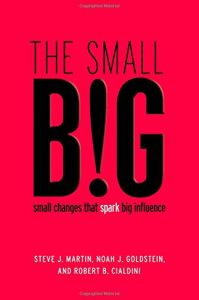Join getAbstract to access the summary!

Join getAbstract to access the summary!
Steve J. Martin, Noah Goldstein and Robert Cialdini
The Small Big
Small Changes that Spark Big Influence
Grand Central, 2014
What's inside?
When it comes to changing someone else’s behavior, it’s the little things that count.
Recommendation
Using persuasiveness to alter another person’s behavior doesn’t require a monumental effort. Little things often foster the biggest shifts. As United Kingdom-based behavioral scientists and professors Steve J. Martin, Noah J. Goldstein and Robert B. Cialdini demonstrate, minor changes in everyday life can yield significant changes in the way people act. Drawing from an abundance of scientific research, they provide intriguing insight into human behavior and offer telling examples of how to alter other people’s actions. getAbstract recommends this fascinating educational experience to managers, marketers and anyone who needs to persuade.
Summary
About the Authors
Arizona State University professor emeritus Robert B. Cialdini is president of UK-based Influence at Work, where Steve J. Martin is the director. Noah J. Goldstein is a professor at the UCLA Anderson School of Management. They also co-wrote Yes! 50 Scientifically Proven Ways to Be Persuasive and Cialdini also wrote Influence: The Psychology of Persuasion.


















Comment on this summary